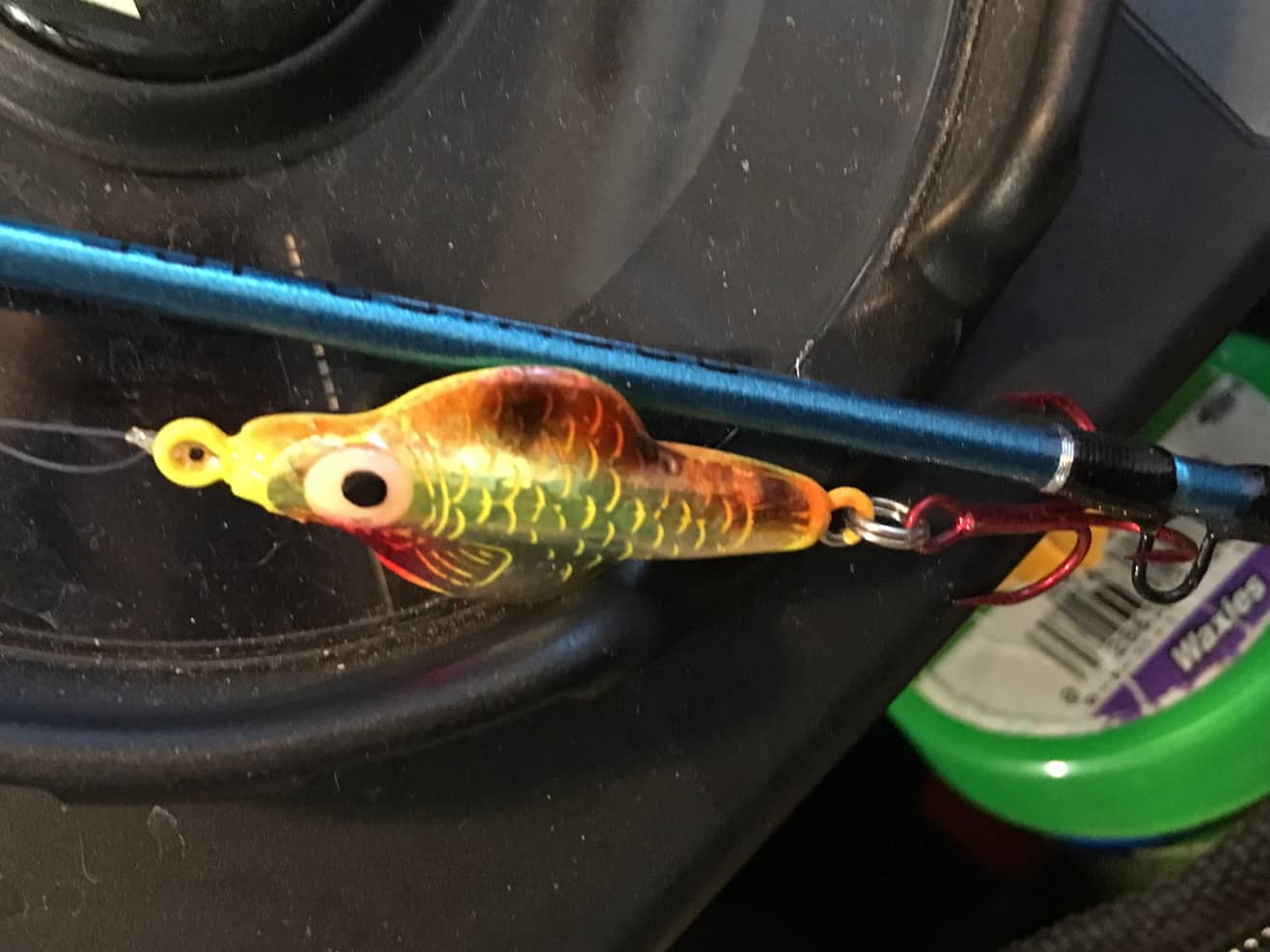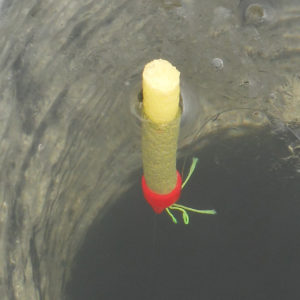
Jigging spoons have come a long way, like the Lindy Flyer which builds in a cup for a fluttering fall and a rattle for added attraction. Simonson Photo
By Nick Simonson
In the blink of an eye which has been human existence, we’ve gone from living in caves to designing skyscrapers that touch the heavens. Where travel by horse and carriage brought messages from east to west over a period of weeks, electronic impulses now carry them in seconds.
In the fraction of that blink has existed the modern age of ice fishing, where in just 50 years or so, we’ve gone from hand augers and hope for a bite to suitcases full of finesse lures and specialized rods and electronics that can pick a fish out of the last dying weeds on the bottom of a lake, and make it bite. What follows are the first five of the ten greatest ice fishing innovations in the last half century in terms of tackle and tech specifically designed for hardwater angler success.
10. Tip Ups. In one form or another, a set line for winter fish has been a staple, including models made from willow branches and sticks woven together in a cross and placed over a hole for pike when ice fishing was more about survival than recreation. However, in the last twenty years, tip-ups have evolved and advanced in size, style and deployment for fish of all kinds, and with that development they have greatly decreased in cost. It’s unusual to come across an ice angler with less than four of these fish traps in tow, rigged with Dacron, superline or monofilament for a variety of applications from pike to walleyes to trout. Increased sensitivity and better components, along with accessories like lights, pagers and even Bluetooth alert devices, make the modern tip-up the ultimate example of ice angling evolution from its earliest days.
9. Jigging Spoons. I once invited a buddy from school to go ice fishing on Devils Lake, and before we made the run, we headed to the local tackle shop after I explained what I had been catching the fish on in my previous outings, I could tell I was speaking Greek. The shopping spree was his first introduction to offerings like Northland’s Buckshot Rattlespoon, which had just been introduced a few seasons prior. Along with other models like the venerable Kastmaster and Swedish Pimple, he placed his twenty bucks on the counter and we were off. Helping him clip the old run-through balsa floats and single hooks from his line, I showed him that when in conjunction with a Vexilar, those spoons could bring fish in and make them bite in a way that a “stare-at-the-hole” setup could not. For the rest of the day he expressed his amazement at what options these lures provided in terms of presentation as walleyes and perch rocketed up his ice hole. Since then, the market has exploded, offering all sorts of under-ice spoons in a variety of shapes, sizes and presentation methods, making this active winter presentation one of the best for species of all stripes.
8. Tungsten Jigs. With the popularity of panfish increasing among ice anglers, thanks in part to a dedicated tournament circuit and the nature of winter fish to be more finicky, the tungsten jig has expanded to provide a fast-dropping, ultra-tiny offering. About 75 percent heavier than lead, tungsten jigs can be smaller and appear more natural to panfish like bluegills, crappies and perch. When these fish are eying up small prey items like daphnia, bloodworms, and chironomids in mid-winter and they’re already somewhat lethargic from the cold conditions, the advancement of jigs offered in tungsten gives anglers an answer to their negative attitude. Additionally, in a hot bite when a school is below, but at a greater depth, tungsten jigs get down there faster and keep anglers on the action before the group moves on, adding a few more fillets to a bucket of keepers. While slightly more expensive, the investment is worth the added weight and smaller size.
7. Flipover Shacks. The flipover shack, consisting of metal poles and a fabric cover which form a tent that rotates around an axis on a plastic sled has been a staple of mobile ice fishing for the past 20 years. It deploys quickly and can be towed by foot or winter vehicle from spot-to-spot, making hardwater angling more like summer fishing. Where once a permanent shack or a plywood-and-tarp pop-up was the only option, models of flipovers have proliferated, providing options for the single angler on up to the family of four that fishes together. Innovations in coverings help retain more heat and keep things comfortable, even on chilly days, and the sled-based storage ensures a place for nearly every rod, tackle pack and accessory during travel.
6. Ice Buster Bobber. When the classic yellow foam stick with the red plastic catch at its base came out, it was so simple and successful it was scary. The foam didn’t stick to a fine layer of ice for those live bait setups deployed outdoors, and the slush in the hole didn’t affect the float from going down inside a shack. The stick was easily trimmed so the buoyancy could match the weight of the presentation below, and at about a dollar a piece, they were easily cut without hurting one’s pocketbook, providing an easier take and less resistance when a walleye or perch took the bait. The Ice Buster became the predominant float, as center-hole balsa and other foam options were pushed to the back of the ice angler’s tacklebox. Today, more than two decades after its invention, the yellow-and-red foam Ice Buster bobber remains a symbol of modern ice fishing.
In next week’s installment, we’ll look more at the technology, machinery and the magic of innovation that has changed the smooth surface of lakes across the ice belt into shantytowns populated by successful anglers.

